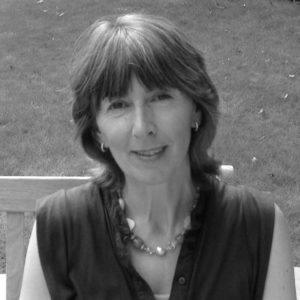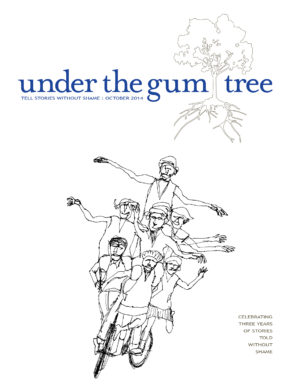Mary Collins

Mary Collins moved to the United States from England, where—as you’ll come to read—she had been writing “expressionless” research based articles for medical and nursing journals. She first discovered her passion for creative writing late in life when she set out to untangle the knots of childhood and put the conflicting tales of her father in order. Mary recently received Solstice Literary Magazine’s 2014 Award for Creative Nonfiction. Her work has also garnered scholarships to the Norman Mailer Writers Colony and a contest prize on Brevity Journal’s blog. She lives on Cape Cod with her husband and her son. She’s working on a book-length memoir, and she REALLY loathes cooking.
Mary was the first reader at our 3-year anniversary reading, which you can hear at the 4-minute mark on the recording.
When and why did you start writing?
I began writing creative nonfiction about eight years ago, when my son started kindergarten and I had some quiet time. Prior to that I’d written for medical journals as part of a job: the kind of writing that offered no scope for creative expression.
My brother had recently died and it troubled me that I couldn’t put the events of our childhood in order. There were so many gaps, and it all felt so muddled. Writing helped to organize and revive memories and—unexpectedly—brought me to a great sense of peace with the past.
I suppose, when I think about it, I’ve written since I was tiny. I can still call up the visceral awe I felt at hearing my first teacher read a poem. You could do that with words? I was enchanted, and began making “books” of my own: stories about animals, poems, wild-flower pressings. I have them still. They are funny, revealing, and sad. I’m working on a collection of themed essays that prompted me to dig the books out from storage. I’ve been stunned to discover that almost every story repeats the same theme: juvenile animals lost and found. Funny how those same themes have played out, metaphorically, all these years later in the UTGT essay. I hadn’t seen that.
What do you enjoy most about writing?
All of it, and none of it. It’s the best and worst, the easiest and hardest way to pass a day.
I love the joy of discovery that comes with reflection. Metaphors and echoes and patterns reveal themselves as a piece comes into being. Almost always I begin with no clear sense of where I’m going with a piece. I start out with something that comes to me unbidden: a memory, a fragment, a smell, and it drives me to write, to follow it and see where it takes me. The beauty of writing is that it always delivers far more than we ever imagine we’ve retained in memory.
And there’s so much resolution in writing from real-life; so much that I’ve been able to reach a deep level of acceptance of and compassion for through writing. There’s a growing body of research to support the notion that the act of writing is dramatically more effective than talk therapy in resolving trauma. Take a look at this very recent post by writing teacher Mary Carroll Moore, referencing an article on this subject in the Harvard Business Review. There’s also the joy that comes from the product of any creative endeavor: of something existing in the world that hadn’t even been conceived of before you sat yourself down to write. That excites me.
Where do you find your biggest inspiration when you write?
I suppose the material I have to work with is my main inspiration. I’ve been blessed (or afflicted) by the kind of life experiences that create rich seams of material to mine. Lots to poke around in, and find angles on.
I’ve had some exceptional writing mentors along the way: Michael Steinberg, my first and enduring mentor, taught me the invaluable lesson of working to master the essay form before tackling a book-length memoir. Kaylie Jones taught me the necessity of restraint in memoir-writing; how less really is more; how not to “bleed all over the page.” I finally got on track with how to shape a manuscript through working with Mary Carroll Moore. Her online workshops are excellent.
Do you have a writing schedule?
I write to avoid cooking. Actually, I have no schedule. If things are going well, I go at it for hours. At other times I don’t go near the writing for days. Or weeks. But I believe that there’s never a time when we’re not somehow working on the writing, even when we think we’re doing something else. It needs steeping time. And I firmly believe that engaging in other forms of creative expression helps the writing too. (Anything but cooking, that is.)
What is the hardest part of writing for you?
The bit that comes between right after starting a piece and right before editing a draft (which is to say, most of it). I’m happy starting, and I absolutely love editing and polishing once I’ve got the first draft done. But most of the time I find the actual writing absolute torture. Sometimes it just flows and seems to write itself, and that’s beyond gratifying. But the rest of the time it almost physically hurts trying to stay in the chair and keep going. So, a lot of the time I don’t. It’s a good job that my family’s livelihood doesn’t depend on me writing. Perhaps if it did I’d have more discipline, and be less of a perfectionist.
How long does it usually take you to finish a story?
It depends whether it arrives as a gift, as I mentioned above—in which case it can be a day or two for a short piece. Longer essays (5,000 words or more) I can work on for more than a year before I feel that I’ve nailed what I’m really trying to convey and can let it be. I have half a dozen pieces at various stages of development at any one time. I much prefer letting things sit a while and going back to them with a fresh eye as they progress.
Are you working on anything now?
A number of things, mostly to the same end: several series of linked essays on themes which have presented themselves over these years of putting the past in order. I write poetry, too, and like to try the same story in both forms: prose and poem. I also like to switch point of view and tense and see how the same story feels in first, second or third person, and with the immediacy of the present tense or the reflective tone of the past. Writing or re-writing a piece as a prose poem really helps me tighten the language.
How many rejections did you get before you had something published? How did you deal with them?
I had a horrible experience following one of the first writing classes I ever took. The instructor (a published writer herself) insisted upon everyone sending their brief memoir piece to the journal that she picked as the one most likely to publish it. She even collected all our packets to mail them herself, to ensure we didn’t chicken out. She raved about my piece and insisted I address it personally to the revered editor of The Atlantic, who was a friend of hers. I was stunned. Surely I couldn’t be that good right off the bat? But like a lamb to the slaughter I was taken in by her rabid enthusiasm for my work. The rejection slip that rapidly followed would have been easier to bear had the editor not written on it, “I fear this is rather lightweight for us. Give my regards to J.”
How did you celebrate when you got your first acceptance?
I photocopied the $500 check before I banked it, and pinned it above my desk. I’m hoping it won’t spend its entire life alone . . .
Do you prefer typing or pencil to paper when you write?
Both work. Or not. I more often write directly onto the screen though, even though I believe that there is something magical that passes between brain and heart and hand when we wield a pen/cil. Now I think of it, I never type poetry directly onto the screen. I have a notebook I use for poems. Any notes and brainstorming on structure, etc. I always write in longhand. On a bazillion scraps of paper.
What do you do when you’re not writing?
Anything that makes me look too busy to cook. I’m into Feng Shui and clutter clearing at the moment so am totally distracted with turning the house upside down and just letting stuff go. I haven’t been writing much since I began the clearing, but my sense is that I’ll come back to it fresher and feeling less encumbered by the weight of all that’s no longer of value to me.
Who is your favorite author?
Horrible question: Too many to mention. I greatly admire Andre Dubus III. He really knows about the alchemy of creating something beautiful from lives that are anything but, both in his memoir and his fiction. I read everything Per Peterson publishes (exquisite writing and story-telling), and have recently re-read Jenna Blum’s stunning and gripping novel Those Who Save Us. For memoir, Jeanette Winterson, Mary Karr, Abigail Thomas and Joan Didion. Anne Lamott for telling it like it is, and with humility. Lee Martin is a gorgeous writer and an extraordinarily generous literary citizen. He does so much to support writers.
One of my favorite recent reads is Anthony Marra’s novel A Constellation of Vital Phenomena. Apparently, his process of revision involved retyping the entire manuscript half a dozen times. He believes that we consider and re-consider each word, sentence, character, etc. from a higher and deeper perspective each time we retype it. It’s a strange but logical paradox: gaining distance from getting really close. My favorite contemporary memoir is Bleeder by Shelby Smoak, a deeply moving but unsentimental insight into life and coming-of-age as a hemophiliac given the dubious gift of HIV through an otherwise-life-saving blood transfusion. I balk at writers being called brave for facing down their stories. But here is a man baring unimaginable angst with such grace and not a hint of self-pity. The writing is beautiful. I especially fell in love with his parents through the writing.
I’ve found myself picking up new short story collections. Rebecca Lee’s Bobcat is wonderful.
It feels horribly unimaginative to mention Catcher in the Rye, but I have to. Holden Caulfield is like a son to me, he is so real. He has to be one of the most credible and endearing characters ever created.
What are some of your favorite books?
Having mentioned a good few above, I’ll shift the focus to a collection about the craft of writing. The recent Rose Metal Press Field Guides are absolute gems. Each is like an MFA program in a slender volume. I’ve learned so much from them. Anything that has the hand of the wonderful Dinty Moore in it is bound to be a great investment.
Do you have any advice for other writers?
Find your own rhythm and a process that works for you. Don’t buy into someone else’s, or beat yourself up for not writing every day. Don’t underestimate the value of stepping away from the page to go out for a walk or potter in the garden. And trust that all kinds of creative endeavor work your writing muscles.
But above all, READ. We never become better writers without constantly improving as readers. We learn the craft only by finding and immersing ourselves in the work of those whom we can admire.

